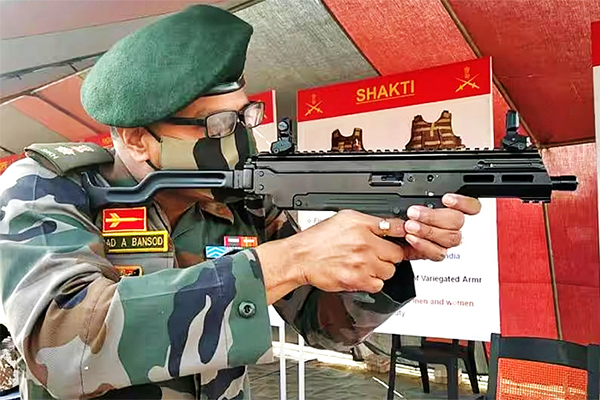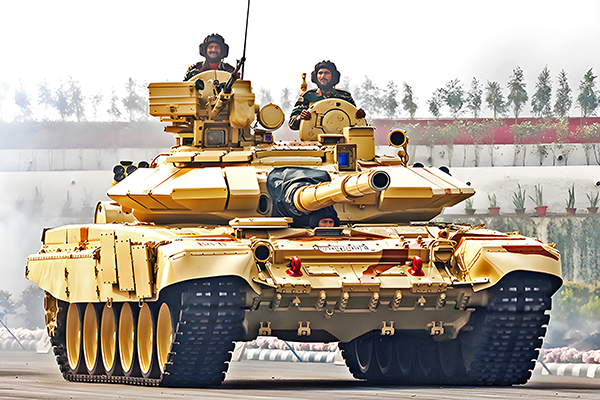
Gearing up to equip its Special Forces with indigenous small arms, Indian Army will procure ASMI pistol and T9 submachine guns. The contract to supply 550 units of the 9x19mm submachine pistol “ASMI” to the Special Forces of the Indian Army has been awarded to Lokesh Machine Limited.
The revolutionary pistol ASMI is the brainchild of Col Prasad Bansod from the Infantry School, Mhow and supported by the Defence Research and Development Organisation’s (DRDO) Armament Research & Development Establishment (ARDE) in Pune.
Developed in a record time of just four months, ASMI is an impressive feat of engineering prowess, firing the in-service 9 mm ammunition. ASMI boasts an upper receiver crafted from aircraft-grade aluminium and a lower receiver made from carbon fiber, utilising cutting-edge 3D printing technology for components like the trigger.
ADMI sports an 8-inch barrel and a high-capacity 33-round magazine, weighs under 2 kgs when empty, offering versatility with its full-length integral Picatinny rail and M-Lok slots for accessories.
The potential applications of ASMI within the Armed Forces are vast, catering to various roles including personnel weapon for vehicle detachments, commanders, tank and aircraft crews, drivers, dispatch riders, radio/radar operators, close-quarters combat (CQB), counter-insurgency (CI), counter-terrorism (CT) operations, VIP protection, and policing duties.
The name “ASMI,” symbolising pride, self-respect, and the diligent efforts behind its creation, resonates the significance of indigenous production. With an estimated production cost of under Rs 50,000 per unit, ASMI holds promise not only for domestic security forces but also for potential export markets, reflecting India’s strides towards self-sufficiency in defence manufacturing.
Similarly, the JD Taurus joint venture formed by Brazilian company Taurus Armas SA in collaboration with Jindal Defence, is set to supply 550 T9 submachine guns to the Indian Army for the first time. The deal valued at approximately Rs 4.26 crore, marks a substantial advancement in bilateral relations, particularly within the defence sector.
The contract to supply T9 submachine gun will ensure timely and best of the technology being available to the Indian armed forces and the paramilitary forces. In the joint venture company JD Taurus, Taurus Armas SA holds a 49 percent stake and this partnership underscores the growing cooperation between India and Brazil in defence.
The Indian Army’s acquisition of 550 advanced submachine guns signifies its commitment to modernising its arsenal and enhancing operational capabilities. At the same time, the intense competition from vendors like PLR Systems, Jindal Defence, and Lokesh Machine Limited, this procurement showcases India’s indigenous defence manufacturing capabilities.
Jindal Defence’s Taurus T-9 submachine gun has emerged as a formidable contender in India’s defence market. Recently, Jindal Defence Systems Private Limited (JDSPL) inaugurated its state-of-the-art firearms manufacturing facility in Hisar marking a significant stride towards revolutionising India’s domestic weapons production and reducing reliance on imports. The sprawling two-acre facility amalgamates global expertise with cutting-edge technology.
JD Taurus is strategically positioned to address the escalating demand within India with an annual production capacity of 250,000 weapons. In the upcoming fiscal year, the company targets a production output of 25,000 to 30,000 firearms, facilitated by rapid scalability and product diversification.
JD Taurus’ facility boasts certifications for a diverse range of products, with substantial value addition in India for rifles, carbines, submachine guns, machine pistols, and revolvers.
While logistical challenges may arise, including maintenance and spare parts management, the decision to procure submachine guns from multiple suppliers underscores India’s pressing defence needs and the strategy to diversify procurement channels. Moreover, this approach ensures timely delivery of critical firearms to bolster national security efforts.


















